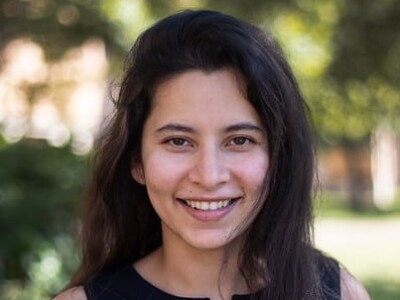From: Louisville, Kentucky
Why social work? I grew up watching my father give back to our community as a selfless leader. He has always been so compassionate, empathetic and hardworking. The values he imparted to me as a child have been instilled in me to this day. I always knew I wanted to go into a profession where I could practice love and empathy every day.
Why UT Austin? I wanted to be part of a transformative learning environment that is inclusive, supportive and uniquely diverse. I knew that a bachelor of social work at UT Austin would give me the opportunity to give back and connect with people from all walks of life. I wanted to be Steve Hicks School student because I wanted to be a part of a school that prioritizes mental health and students’ needs!
A favorite social work course: In professor Cynthia Penwell’ class, Introduction to Social Work, I learned about social work approaches and it gave me a different perspective to see things around me. It made me realize how in our profession we could really make a difference for people, systems, and communities. I also remember when professor Penwell said, “ Pramila, it’s going to be okay,” because I was anxious about a paper! Every day after that, I’ve been living by the motto “It’s going to be okay.” This has kept me going so far!
Any extracurricular activities? Tri Delta Sorority, Nepalese Student Association, Intramural Sand Volleyball. I also work with individuals battling homelessness and housing instability through the student-run, free C.D. Doyle Clinic in Austin. And I am a FACETS scholar; FACETS is a program of the Harvard T. H. Chan School of Public Health that takes a holistic approach to cultivating the next generation of scientists. Through FACETS, I conducted research on environmental and educational disparities in Massachusetts K-12 schools.
Field experience: I am doing case management for the American Red Cross’ Service to the Armed Forces. I am also developing a curriculum for the American Red Cross that prepares workers and volunteers for emergency response to mass casualty events (pre- and post-deployment).
What’s next after graduation? I plan on attending graduate school to pursue masters of public health and of social work. Eventually, I want to start a nonprofit organization that focuses on addressing higher education and social determinants of health.
Advice for prospective BSW students: Take advantage of the DiNitto Career Center and the CARE program of the Counseling and Mental Health Center, both of them available at the Steve Hicks School of Social Work. Don’t be afraid to reach out to professionals who have careers that you find interesting and do informational interviews with them. Going into the social work field you do not have to figure it all out — it’s going to be okay!


